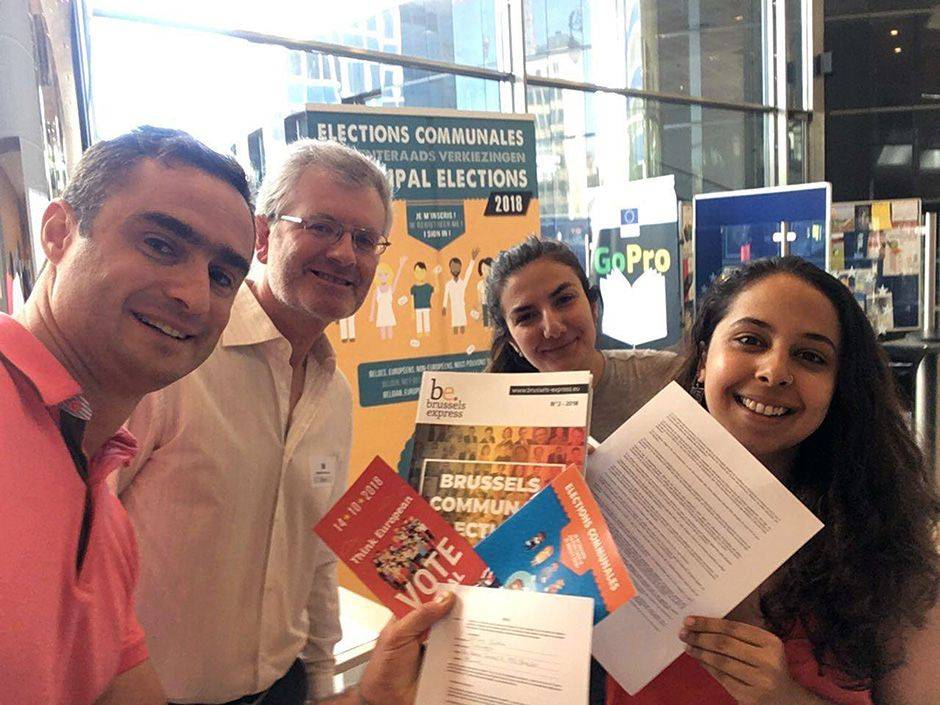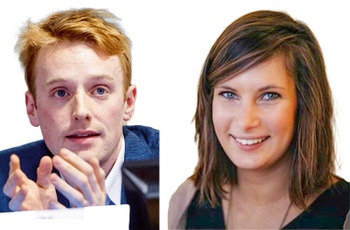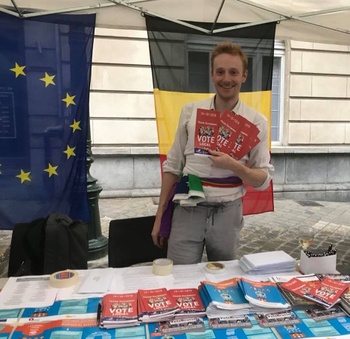Thanks to an unprecendented campaign, more non-Belgians will vote in the local elections next month. Still more efforts are required to strengthen local democracy though, argue Thomas Huddleston, VoteBrussels coordinator and Research Director at Migration Policy Group and Louise Nikolic, doctor in political and social sciences (ULB).

© BRUZZ
| VoteBrussels on one of the action days in the European Commission buildings.
'Voter registration needs to become quasi-automatic'
The official statistics are out: in Brussels, the number of non-Belgians voters doubled to reach 49,406 in just 5 months. That means the registration rate has risen to 17%, an increase of 24% compared to the 2012 local elections. Brussels registered more new voters than Flanders and Wallonia combined. 81% of all new voters since 2012 are Brussels residents. The registration rate in Brussels increased by 3 percentage points compared to 2012, while the rate decreased by one percentage point in Wallonia and two in Flanders.
What explains Brussels’ surprising success? The process started at a disadvantage. 14% of non-Belgians were registered in 2012, but only 9% remained registered in June 2018. Although non-Belgians could have registered at any time during the past six years, most communes did not start to inform or register them until June—less two months before the registration deadline.

© BRUZZ
| Thomas Huddleston, VoteBrussels coordinator & Louise Nikolic, doctor at ULB.
In addition to this major delay, striking disparities persist across the 19 communes because most communes did not do much more in 2018 than in 2012: mostly information letters sent to non-Belgian voters and articles published in the communal magazine and website. The communes with the most active administrations and candidates – Bruxelles Ville, Etterbeek, Ixelles, Schaerbeek, Saint Gilles, Saint Josse – saw the greatest increases in their registration rates and numbers.
What made the real difference in 2018? For the 1st time, the Region, the European Commission and the Brussels Commissioner for Europe got involved and worked with volunteers to adopt effective methods to reach new voters:
- Multilingual websites, brochures and letters to all eligible voters and to all staff of the European Institutions
- Email applications accepted in 15 of the 19 communes, thanks to guidance from the Region
- Networks of volunteers like VoteBrussels, funded by the Region and the European Commission, to answer questions through social media and face-to-face events, such as a Day of Action in the major European Commission buildings
With this unprecedented campaign behind us, what could the future of Brussels democracy look like?
Perhaps the most Belgian solution would be to abolish the obstacle of prior voter registration. Voter registration has not been part of Belgium’s democratic culture for 125 years since obligatory voting in 1893. As a result, authorities and political parties do not spend the time and resources required to reach nearly 300,000 people.

© BRUZZ
| BruVote in action.
Lack of information on voter registration and obligation voting remain the principal reasons why most non-Belgians do not register. Belgium’s top experts on the topic (Philippe van Parijs and Dirk Jacobs) recommend that the federal parliament make voter registration automatic for all potential voters (Belgian and non-Belgian), as in other EU countries, and make voting either voluntary or obligatory, but with the right to opt-out for non-Belgians as required by EU law.
But Brussels cannot wait for a potential federal reform because of the democratic deficit that is unique and urgent for the Region and its communes. 20% of potential voters do not vote because they are not registered, while an additional 15% of Belgian registered voters choose to abstain from voting. That means that around 40% of all Brussels voters – Belgian and non-Belgian – will not vote in October. The old way of doing democracy no longer functions in Brussels.
The old way of doing democracy no longer functions in Brussels.
The solution is simple: voter registration needs to become quasi-automatic. The authorities should continue and strengthen what they began with the European institutions and their non-partisan volunteers. The letter of the Region, made more simple and personal, is automatically sent to each newcomer and resent every few years. They can then register online (email, Iris-box, e-guichet) and be invited to ‘ateliers démocratiques’ to learn more about the participatory policies of Brussels communes, region and associations.
In order to better coordinate this process with the communes, the Brussels Region should take the lead, as the Region is the entity responsible for the organisation of the local elections, the integration of newcomers and the European institutions present on its territory. A regulation and a budget should be adopted and the Office of the Brussels Commissioner for Europe should be reinforced. The European Institutions should also contribute. This process could already be piloted for Europeans for the European elections in 2019.
Due to the presence of the European institutions, Brussels is home to some of Europe’s top experts on the great challenges facing the Region and its communes: urban planning, mobility, environment, energy, inequalities, entrepreneurship, integration, security and so on. Surveys suggest that non-Belgians agree with their Belgian neighbours on most election and reform issues. More and more are running as candidates, but many more want to give back to their neighbourhood where they feel at home.
The Brussels Region, as the diverse and mobile capital of Belgium and Europe, must reinvest in its democracy with ongoing voter registration. Greater participation would mean more competitive and inclusive elections and greater legitimacy and trust for its elected officials, for the benefit of all.
Lees meer over: Brussel , Brussel Kiest 2018
Fijn dat je wil reageren. Wie reageert, gaat akkoord met onze huisregels. Hoe reageren via Disqus? Een woordje uitleg.